 Petzlover
PetzloverBoth Asian and Cymric are originated from United Kingdom. Both Asian and Cymric are having almost same weight. Asian may live 3 years more than Cymric. Asian may have more litter size than Cymric. Asian requires Low Maintenance. But Cymric requires Moderate Maintenance
Known also as the Malayan, the Asian cat is likened to the Burmese but just with different coat patterns and colors.
This particular cat breed was developed in 1981 in the UK. Apparently there was a mistake mating between a Lilac Burmese and a Chinchilla Persian and kittens from these were born in 1981.
So beautiful were they that a breeding program started with new coat colors and patterns. The breed got the name ‘Asian’ with all the varieties reaching GCCF Championship status.
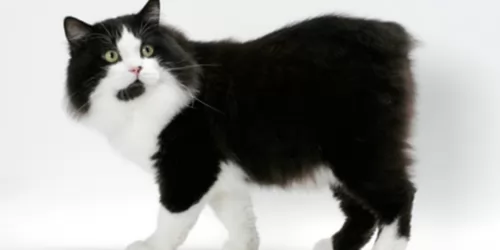 The Cymric is a naturally tailless cat although having said that, not every Cymric is completely tailless.
The Cymric is a naturally tailless cat although having said that, not every Cymric is completely tailless.
It’s actually a long-haired Manx cat this and thought to date back to 1750. It is one of the oldest cat breeds.
Known also as rumpies or stumpies, the taillessness of the Manx an Cymric started as a mutation among the island's domestic cat population. Long-haired kittens were born to Manx cats on the Isle of Man, but in the 1960s, similar kittens were born in Canada and then specifically bred.
The Cymric became popular, even though it took years for the Cymric to be recognized as a breed of its own by cat associations. The International Cat Association (TICA) gave the cat breed status in 1979.
The Asian cat is medium-sized and muscular. The male cat is somewhat bigger than the female and weighs roughly 5 – 7kg while the female will weigh roughly 3 – 5kg although most times, there is not much difference in size between the males and females.
The attractive cat has a round head and wide-spaced ears with large green eyes. It’s a slender cat, but athletic with slender legs and medium thickness tail. Asian cats come in a wide range of colors such as fawn, chocolate, black, blue, cinnamon. The coat is short, fine, and silky and the Asian doesn’t require too much grooming.
These are friendly, playful cats and they get on well with children if the children are kind, gentle and respectful with him. This is a fairly dependant cat and he will actually follow his favorite human being, crying out for attention.
The Asian is a social cat and can fit well into different homes. However, because it is a social cat, they require an owner that is willing to spend time with them. They’re cats that are sensitive to the moods of their owners and make excellent companions.
They’re adventurous cats and enjoy exploring and traveling, voicing their opinion on different things as well. The Asian thrives on the attention it gets from their human owners. It’s a sociable cat and is quite talkative too.
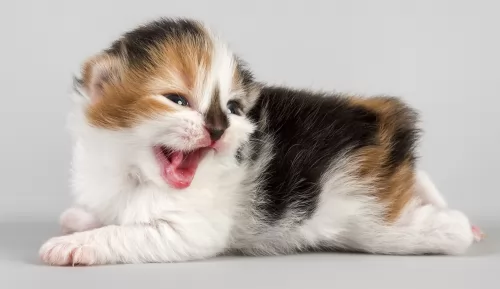 The Cymric is a medium-sized cat that can weight between 4 and 6kg and he is round in shape and stockily built. The back legs are also longer than the front legs.
The Cymric is a medium-sized cat that can weight between 4 and 6kg and he is round in shape and stockily built. The back legs are also longer than the front legs.
He has a short, arched back with a broad rump. The unusual but beautiful Cymric has long hair and a thick double coat that is glossy and vibrant. Some cymrics have tufts of hair on their ears and toes.
All colors of the coat are available and it can be solid or patterned - white, blue, red, black, cream, tortoiseshell etc.
The eyes are large and can be green, copper, or yellow. The ears are widely spaced with rounded tips.
The Cymric is described as a sweet-natured, placid cat that doesn’t get ruffled over much, though he does get excited about his human family.
He tends to be reserved around strangers. He is a loving cat and simply loves being around his human family. He is a strong cat and intelligent too and he is quite capable of watching you and then learning how to open doors and get into cupboards.
He is sociable and talkative too and enjoys ‘talking’ to you, especially when he has attached himself to one member of the family. He thrives on his human family's company and is a cat that provides lots of entertainment for you. Even though he becomes attached to one family member, he gets on well with children and pets in the home.
The Asian cat is such a sweet animal – gentle and affectionate and also very sociable. They are also curious and intelligent and vocal enough to let you know their needs. They're strong-willed if they want something.
The Asian makes an excellent companion for singles, couples, families or the elderly. They also get on well with children and with other pets in the home.
There are quite a few Asian cat varieties and each one promises to make you an excellent companion.
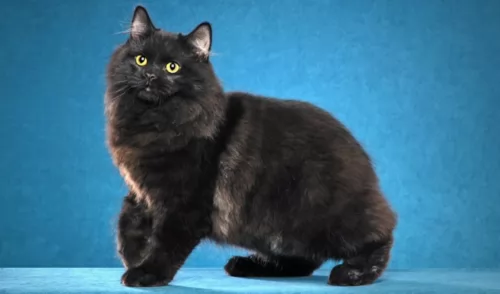 Yes, the Cymric has quite a few health issues but many people choose to overlook these as they love the personality of the lovable cat breed.
Yes, the Cymric has quite a few health issues but many people choose to overlook these as they love the personality of the lovable cat breed.
It’s such an intelligent cat too but best of all it offers total love and companionship.
It is certainly an unusual domesticated cat breed that appeals to many different people and it is guaranteed that you’ll also find him one hang of a feline pet.
Although there are no specific health issues with this cat, because of it being associated with the Burmese, it may be more susceptible to diabetes mellitus than other breeds.
There are many cats in modern times developing diabetes mellitus – where they are unable to produce enough insulin to balance blood sugar. If the disease goes untreated it can lead to dehydration, vomiting, depression, weight loss, and even death. Your cat will be thirsty and urinating more frequently. There are various treatments and the diet for the cat will need to change too.
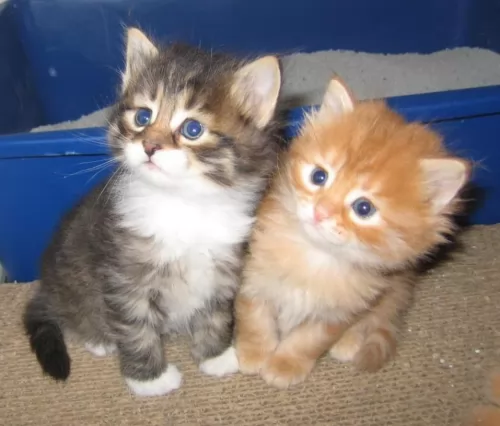 If you look after your Cymric well, he can live to a good age of up to 15 years. The lack of a tail is a genetic defect and the cat’s deformed spine can cause health problems including arthritis.
If you look after your Cymric well, he can live to a good age of up to 15 years. The lack of a tail is a genetic defect and the cat’s deformed spine can cause health problems including arthritis.
In fact, the cat’s lack of a tail causes some serious diseases. The defective gene responsible for the loss of the tail affects the spine and can actually cause spinal problems. In fact, when completely tailless Manx cats mate, the defects can be so severe that some of the offspring are born dead.
People often speak of these health issues of the cat as the Manx Syndrome.
Some cats have a narrowing of the anal passage and this can lead to bowel blockages. Make sure to get your Cymric vaccinated against deadly cat illnesses and ensure veterinary checks for parasite control and illness.
To take care of the cat’s shiny coat, you can gently brush your Asian every week, not more, as they are short-haired cats, they’re not heavy shedders and they are low maintenance.
Age and general health will influence the way you feed your Asian cat. You’ll want to be feeding your feline friend the very best food there is as this will contribute towards his good health.
If you opt to feed your cat a commercially manufactured cat food, higher protein levels in wet foods might be better for your carnivorous pet. You don’t want to provide your cat with a high protein diet that is deficient in amino acids.
That is why it is important to research cat foods and their ingredients and get to know what are the most important ingredients for your cat to be getting. At all costs, avoid your cat becoming obese.
Make sure your cat has access to fresh cool water to maintain his body temperature.
Check your cat’s teeth, as he can’t convey to you that he is in pain – you need to check inside his mouth. Redness inside his ears might be indicative of an ear infection.
Whenever your cat seems to be ill, get him to the vet.
Provide your cat with a litter box that is kept hygienically clean.
Provide your cat with food- and water bowl, a brush for grooming and warm, dry sleeping basket.
Have your Asian neutered or spayed to prevent unwanted kittens.
Make sure your cat’s vaccines are up to date.
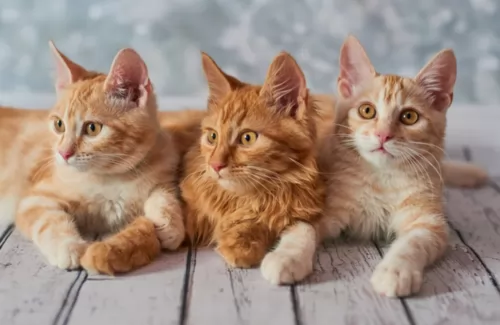 As a kitten, provide your Cymric with food appropriate to its age. Once your cat turns one, you can start feeding him adult cat food. There are a whole lot of excellent commercially manufactured cat foods – dry and canned foo – but always choose a high-quality one where the first ingredients listed are always meat. This is because the cat is a carnivore. Make sure the food has taurine, which is an essential amino acid for cats.
As a kitten, provide your Cymric with food appropriate to its age. Once your cat turns one, you can start feeding him adult cat food. There are a whole lot of excellent commercially manufactured cat foods – dry and canned foo – but always choose a high-quality one where the first ingredients listed are always meat. This is because the cat is a carnivore. Make sure the food has taurine, which is an essential amino acid for cats.
This cat has a thick coat and he will need a brush at least twice a week, especially as he is a high shedding cat. While you brush your cat, look out for any problems such as red areas, hair loss, sores or irritated skin. Take note of any unusual lumps.
Some people take their Cymric to the vet once a year for a routine medical check-up. They have the nails clipped and the ears and teeth checked. It is also a great way to get your queries answered on the nutritional and health needs of your pet.
You will need to have your Cymric’s nutrition checked to keep him in tip-top condition. The Cymric cat has a good appetite and his build can allow him to put on weight easily. Obesity can put pressure on the spine and lead to all kinds of joint problems.
Provide your cat with a litter box and keep it immaculately clean.